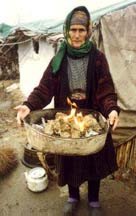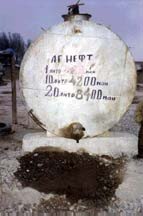|

Spring 1997 (5.1)
Pages 30-37

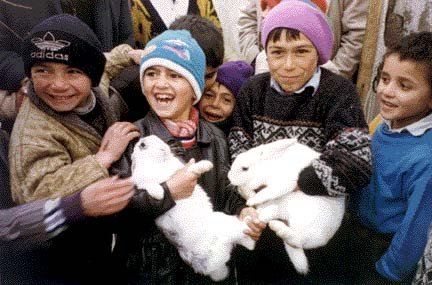
Kids at the Sabirabad #1
camp in Azerbaijan where 12,000 refugees live."Do you want
to see our rabbits?" they asked the journalists.
Photo: Blair (January 1997.)
The 2 1/2-hour drive from Baku
to Sabirabad is lonely and desolate. Pelican-like oil pumps slowly
work the barren land. Discarded pipes of all sizes lie abandoned
in the fields. Snow-covered mountains press down upon the horizon.
There are seven refugee camps in this region. Camp Number One
was once an empty field spread just beyond the railroad tracks.
It's located about four kilometers from town. A sign at the camp
entrance indicates there are several schools and a hospital on
the grounds. Recently, a mosque was built.
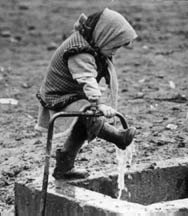  Photo: Elnur Babayev (1996) Photo: Elnur Babayev (1996)
The morning rains have
turned the paths into sludge-mud sucking at your heels. Around
12,000 Azerbaijani refugees live here. It's the largest of all
the camps by far. Typically, 4,000 to 5,000 people reside in
each camp. For many, this is the beginning of their fourth year
in Sabirabad.
The refugees live mostly in mud brick homes, whose single rooms
are covered with blue plastic tarps donated by the UNHCR (United
Nations High Commissioner for Refugees). They've built these
mostly by themselves to replace the worn-out tents they used
to live in. Additionally, most families have improvised some
sort of entranceway with reeds available in the nearby marshlands
to protect against the weather. It also serves as a place to
take off one's shoes before entering the main room-a practice
observed rather strictly. There are still some tents left from
earlier years, weather-beaten from the sun and wind. Most now
serve as adjuncts to the mud brick homes and are used for storage
or poultry coops. Chickens, turkeys and geese peck around in
the dirt.
Small limestone buildings are scattered throughout the camp which
serve as toilets. Each has four narrow compartments. There are
no doors, although a free-standing wall in front of the structure
gives some privacy. But far too many people have to share the
same facilities. As it is winter, the floor and foot grips are
covered with mud and excrement. A small twig broom leans in the
corner. There is no electricity for trips that must be made in
the night.
Interspersed throughout the camp are several outdoor mud ovens
for baking tandur-style bread. Women slap the dough against the
inner walls of the oven which is fired by burning twigs and dried
cotton plants. Bread is the sustenance of life in the camps,
so the light drizzle of rain and snow doesn't deter their efforts.
A few mud brick kiosks are set up to sell candy, soft drinks
and cigarettes. These simple shops provide the only outward signs
of economic activity. Ironically, the colors and slogans of foreign
labels make the camp seem less isolated.
Women walk around outside in housecoats. Boys dash back and forth
in mud-covered slippers or shoes which are usually several sizes
too large for them.
At one end of the camp is the distribution building of the Federation
(Red Cross and Red Crescent) which supplies the refugees with
food. Rations have diminished over the years. "Donor fatigue"
and too many other needy people in other parts of the world have
drained the limited funds. This month, each camp resident is
receiving five kilos of flour, one kilo of navy beans (rice is
substituted some months), 250 grams of black tea and one liter
of vegetable oil. That's all. No fruits or fresh vegetables.
No meat, although there have been occasions when canned meat
was included. And this month, no sugar.
About a dozen badly weathered tents serve as a school. Each tent
accommodates about 20 students at double desks. There is nothing
on the walls to stimulate learning. Nor are there any books,
resource materials, audio-visual aids, pads of paper or even
pencils stacked up anywhere. A few students are lucky enough
to have first-year primers in the new Latin alphabet which appear
very ragged from being handed down year after year. These rare
paperbacks are also much too basic for older students.
Two-hour shifts allow for three rotations a day. Teachers complain
about the dirt floors, the holes in the tents that leak during
rains, and the ever-present cold that numbs hands and feet in
the winter. Kerosene is so expensive that the school rarely has
access to it. And electricity is sporadic, at best. "Can't
you help us?" the teachers implore.
Left: A refugee woman reduced to gathering
dried sheep manure from the fields to warm her mud brick home
in Sabirabad camp.
Right: Kerosene for heating refugee homes is
very expensive in many refugee camps. In January 1997, the price
for less about two gallons of "neft" was about $1 in
the No. 1 Sabirabad camp. Most families have no income. Both photos: Blair (January 1997).
"At the end of this year, we'll go back"
Yadigar Maharramov (age
32) is a former driver, and his wife, Zamina Mammadova (age 31),
is a former school teacher. They have an 8-year-old son, Elshan,
and a 10-year-old daughter, Lala. They fled the town of Jabrayil
in late September 1992.
Behind the thin wooden door, their single room is small but tidy.
Twin-sized beds line the opposite walls, blankets pulled taut.
A kerosene stove dominates the middle of the room, and a television
sits in the opposite corner.
Despite the mud and bits of litter scattered outside, the place
is immaculate. A Federation calendar is tacked high on the wall.
Lala is one of the children beaming from the photograph.
Two little windows about 18" x 12" provide the only
natural light in the room. A naked light bulb hangs from the
ceiling. The camp now has access to electricity during the day-well,
sometimes. Until the refugees complained to the local government,
they had access only in the evening after six o'clock.
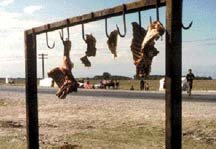  Zamina
keeps her glasses and plates in a low wooden bureau. As we enter,
she pulls several wooden chairs up to the table and immediately
starts organizing lunch. She knew we were coming. Suddenly, soup,
some stew with a bit of meat, bread and tea fill the small table. Zamina
keeps her glasses and plates in a low wooden bureau. As we enter,
she pulls several wooden chairs up to the table and immediately
starts organizing lunch. She knew we were coming. Suddenly, soup,
some stew with a bit of meat, bread and tea fill the small table.
Yadigar served two years in the army when the Karabakh war broke
out. At that time, the villages in and around Jabrayil were losing
10-15 Azerbaijanis a day from Armenian attacks. It was while
Yadigar was away that his wife and two small children had to
flee with Yadigar's brother.
"We knew we would have to leave," Zamina said. "We
knew because of what happened in Khojali where hundreds were
massacred in one night [in February 1992]. And when we heard
Shusha had been captured, we knew we were next. We simply drove
out of town following everyone else who was leaving. I remember
it was raining."
Zamina fled from the 3-room house Yadigar had built himself with
the balcony which overlooked the gardens and fruit trees. She
left behind everything she owned, including the livestock. She
had time only to grab her young children and some bedding.
When Zamina and the children reached the 25-kilometer "no
man's land" between the border of Azerbaijan and Iran, they
thought they would be safe. But the Armenian soldiers pushed
further. So she and her family, along with thousands of others,
were forced to cross over the Araz River into the unknown territory
of Iran. For the previous 70 years under Soviet rule, escape
across the wild, raging waters had always been considered extremely
perilous.
Fortunately, Zamina managed to cross by bridge. Those fleeing
on foot had no choice but to swim. Tragically, many drowned.
For those who did make it, the Iranian government cooperated
by transporting them 60 km further east and then back across
the Azerbaijani border into a safer region near Imishli. It was
there that the Iranian Red Crescent would soon establish tent
camps for nearly 50,000 Azerbaijani refugees.
Later, Yadigar learned that some fellow villagers who had been
taken hostage were forced to set fire to their own houses-after
being looted, that is. The whole village was destroyed. And then
the Armenians left. "No one lives there now," says
Yadigar.
There are about 60 villages in the Jabrayil region. The lower
villages were populated by Azerbaijanis, and the upper ones-about
15 mountainous settlements-by Armenians. "That's where the
attacks came from," says Zamina.
"Despite the fact that we lived in separate villages, the
Azerbaijanis and Armenians were very close to each other,"
Yadigar relates. "We could go stay with Armenians in their
villages, and Armenians could come stay with us in our villages.
After the war started, the Armenian villagers in our region would
often come to us and say, 'This is not our fault. We did not
want this war. The Armenian government and Russia started this
war.'"
But Yadigar says he understands why his neighbors suddenly turned
either nationalistic or passive. "Perhaps, it really was
not their fault. They were terrified of being killed. They were
forced to fight against their Azerbaijani neighbors or else they
would have been killed, themselves."
Yadigar's family moved to the camp in Sabirabad almost four years
ago. Two years later, they moved out of their canvas tent and
into the mud brick home which Yadigar built.
"It's so abnormal, the life here," says Yadigar. "You
can't work. Only a very few children go to school. There's no
oil or fuel to heat them. If it rains, everything gets dirty
and muddy. The roof always leaks."
According to Yadigar, the monthly rations have become smaller
and smaller. The informal system of relatives helping relatives
that enables many in post-Soviet countries to survive does not
play out here because everyone's relatives are also refugees.
The local government gave families 23 liters of kerosene, 2.5
kilos of flour and two boxes of detergent. But that was three
years ago.
Of the 12,000 refugees here, only a few are employed. The Federation
bought some land from the local government and has hired some
refugees to work in the fields. They can earn around 70,000 manats
($18.50) a month. Yadigar was hired by the Federation as a driver
after earning a reputation repairing and maintaining the Toyota
LandCruisers driven by the Federation's staff. He is one of the
lucky ones. "My salary just about covers my needs,"
he says, without disclosing the amount.
Some bartering goes on, according to Yadigar, as well as some
stealing of flour or shoes. But like back home, neighbors watch
out for one another. An additional problem is that the family
unit has become fragmented because so many men are in the army
or elsewhere in cities seeking employment. Says Yadigar, "Much
of the responsibility lies on the shoulders of women who have
no means to support their families."
Yadigar says he could forgive the Armenians if they stopped occupying
the land with their military forces. He would even welcome them
again as neighbors. He reminds us that this is not the first
conflict between Armenians and Azerbaijanis, referring to 1905.
"History gives us hope. Without hope, life would be impossible."
Yadigar believes his children will one day return to their land-"with
America's help," he adds. "They're young. They'll be
able to go back to their homeland again. We always keep telling
them that at the end of this year, we'll go back. Everything
that we're connected to is in Jabrayil. We've left our cemeteries
there-our parents' and relatives' graves. Jabrayil is our motherland.
We constantly dream about going back."
Yadigar and Zamina's children, like most of those we saw at the
camp, appear healthy, happy and loved-quite a parental feat under
the circumstances.
Newborn Brings
Uncertainty
Rana Aliyeva
(age 26) is a high school graduate married to Azer Aliyev (age
27), a former factory worker. Their son Ilham was born on February
26, 1997, three days before our visit.
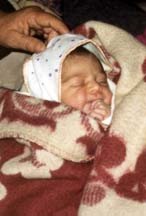  Rana
gave birth in the small mud house which she shares with five
others: her in-laws, her husband and two children. The baby is
wrapped tightly in a beige and blue-striped blanket, as swaddling
is the tradition. The small room is crowded with relatives and
friends. The midwife sits on the bed beside Rana, who is breast-feeding
the infant. She has been attending the young mother for almost
two weeks. Rana received no professional prenatal care. Delivery
conditions were poor-dirty and cold. There was no electricity
and no running water. As if to add emphasis, the lights go out
while we're talking. No one bats an eye. Azer, her husband, embarrassed
by all this women's talk, stands with his back to the group because
there is no other room to disappear into. Rana
gave birth in the small mud house which she shares with five
others: her in-laws, her husband and two children. The baby is
wrapped tightly in a beige and blue-striped blanket, as swaddling
is the tradition. The small room is crowded with relatives and
friends. The midwife sits on the bed beside Rana, who is breast-feeding
the infant. She has been attending the young mother for almost
two weeks. Rana received no professional prenatal care. Delivery
conditions were poor-dirty and cold. There was no electricity
and no running water. As if to add emphasis, the lights go out
while we're talking. No one bats an eye. Azer, her husband, embarrassed
by all this women's talk, stands with his back to the group because
there is no other room to disappear into.
Azer receives 90,000 manats (about $22) a month as a wounded
Karabakh veteran. His parents each get 20,000 manats ($5) a month
in pensions. The family also receives some rations, but complains
that it is far from adequate. "Some days, there is not enough
bread to feed the children," Rana says.
Rana is originally from Tbilisi,
Georgia. In 1991, she married Azer who is from the Fuzuli region
fairly close to Azerbaijan's western border with Armenia. They
fled their village on September 23, 1993. Rana said the attack
came very suddenly while she was eating lunch. It was cold and
raining. They were terrified of being taken hostage. Azer was
in the hospital, so she and the children fled to Iran alone.
A neighbor happened to be driving by in a truck and picked them
up. Otherwise, they would have had to continue on foot.
"We didn't take anything," Rana said. "Only the
children." She has two children now, but lost her 3-year-old
soon after arriving in Sabirabad. Her son had been weakened by
the coldness of the flight, and Rana had had no money for medicine.
Rana's midwife, who has a basic medical license, also does gynecological
work in the camp. Back home, she averaged around 170 deliveries
annually. Last year, she helped deliver more than 30 babies in
the camp. "In my experience, I'm proud to say, I haven't
lost a single child," she boasts. "But in the hospital,
they die." The cries of Rana's newborn are a constant reminder
of the clouded, uncertain future.
The midwife feels bad that the problems inherent to a refugee
settlement are spilling over to the local population. "It's
crowded here. There's malaria, flu and tuberculosis. But it's
not our fault. We're all victims of this war."
Obviously, Rana and her family's primary wish is to return home.
But their second wish? "To have good conditions here,"
says Rana. "The children can't study, can't go to school.
They're growing up uneducated. It's a terrible tragedy for us."
How does everyone keep from becoming depressed or going insane?
"Hope," the midwife says. "And President Aliyev.
Because of his political skills, he has interested other countries
in Azerbaijan. Because of him, the world now recognizes Azerbaijan
as an independent country. He knows that the only way to solve
this conflict is through peace."
Unspoken Horror
Pari Guliyeva (age 34)
is a former kindergarten teacher. Her husband used to be a laborer
and tractor driver. They fled Zangilan with their two children-Khumar
(age 11) and Urkhan (age 7)-in 1993.
The room is immaculate. There are no chairs, so we sit on the
floor on pillows. There's one bed and a brightly painted wooden
marriage chest. Khumar's family also crossed the Araz River into
Iran. Her uncle had picked them up on a tractor. Khumar was 7-years-old
at the time. They stayed three days in Iran and then 15 days
in Imishli before coming to Sabirabad. They slept in the fields,
and when it rained, they found shelter underneath the tractor.
"I was so scared that they would take me as a hostage,"
says Khumar. "They captured my father. He got very sick.
He was in the hospital for five months. He can't speak now."
Khumar's father, separated from his family, swam across the Araz
River to Iran. He has suffered severe shock. His family believes
he was beaten or tortured as a hostage. Four years later, he
is only now beginning to regain his ability to speak. He is not
at all himself, and this is very disturbing to young Khumar.
"She always cries when she thinks about her father,"
says Pari.
Khumar used to receive good marks in school back home, but rarely
attends classes now. The school has little heat or electricity.
The shame factor plays a role as well. Khumar and her younger
brother Urkhan are embarrassed because they don't have good clothes,
school books, pencils or book bags. And yet Khumar still dreams
of becoming an educated professional. "I want to be a doctor
so that I can help sick people," she says.
Pari's family built their mud home themselves. Khumar helped
pour and shape the bricks. Her regular chores include fetching
water from the pump and washing clothes. She likes to knit and
has made several pairs of woolen socks. And she enjoys singing
and dancing. She followed us all day through the camp, delighted
by our presence.
Lingering Images
We visited others whose
stories are much the same - the trauma of flight, the struggles
of survival, the psychological displacement that affects everything
they think and do.
The children are mostly in good spirits. The resiliency of youth
constantly amazes you. Bright smiles flash across their faces.
But on those of the older people, particularly the mothers, their
pain is deeply etched. No matter how hard they try to smile,
their eyes tell a different story.
Climbing into a warm and dry car to leave the refugee camp weighs
down upon your conscience. So many images flash back through
your mind - so many contradictory feelings. You are treated like
a hero for making the day brighter, but you know you are not.
You agonize over your inability to soothe and comfort. Pulling
away from the camp, you try to cast a sympathetic glance toward
the men standing silent as stones, staring without expectation.
A grinning child runs alongside you, his slippers barely staying
on his feet. From the back window of the car, the smiling eyes
and waving hands soon blur into one mass of suffering, but you
know within each mud brick room, the pain is solitary and unique.
Caleb Daniloff, Ruth Daniloff, Khumar Husseinova and Betty
Blair contributed to this article.
From Azerbaijan International (5.1) Spring 1997.
© Azerbaijan International 1997. All rights reserved.
Back to Index
AI 5.1 (Spring 1997)
AI Home |
Magazine
Choice
| Topics
| Store
| Contact
us
|




